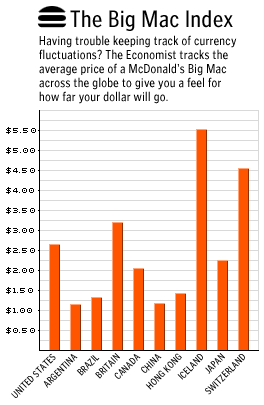NEW YORK (CNN/Money) -
The U.S. dollar, which surged during the 1990's, has finally cracked. And the folks at Tennant Company couldn't be happier.
That's because Tennant's industrial street sweepers, vacuums, and floor cleaners are suddenly easier to sell abroad.
"We've got two choices when the dollar weakens," said Anthony Brausen, Tennant's chief financial officer. "Holding prices constant, which increases our profitability, or reducing prices, which makes us more competitive."
With about 29 percent of sales coming from outside the United States, Minneapolis-based Tennant (TNC: Research, Estimates) counts itself among the beneficiaries of the dollar's yearlong slide.

But investors trying to gain from the dollar's fall face bedeviling tradeoffs. Worse, many professionals won't even guess the direction of the 24-hour, multitrillion-dollar currency market, where seemingly bullet-proof predictions have gone very wrong.
True, a weaker dollar cheapens the price of U.S exports, giving multinational companies a leg up in overseas markets. At the same time, profits earned overseas get an automatic boost. That's because offshore earnings are worth more when converted to dollars.
Take the euro. It was worth 88 cents 12 months ago. On Friday, the euro fetched $1.06, up 20 percent from year-ago levels. The dollar bought 131 yen this time last year. It buys 117 yen today, a 10 percent slide.
But it's tough to make the case that the stock market has noticed. In the past 12 months, the Standard & Poor's 500, whose components derive about 40 percent of sales overseas, has performed about as poorly as the Russell 2000, an index of small companies that do much less business aboard. Both indexes are down about 20 percent during the last 52 weeks.
"I would normally think the multinationals would have done much better," said Tom Laming, chief equity strategist and portfolio manager at Buffalo Mutual Funds, with about $1.1 billion under management.

Laming speculates that rising tension between the United States and both Iraq and Korea, with its implications for hampered trade, may have hurt large multinationals, which include makers of consumers products like Coca-Cola (KO: Research, Estimates) and Procter & Gamble (PG: Research, Estimates), technology companies like IBM (IBM: Research, Estimates), and drugmakers including Merck (MRK: Research, Estimates).
Still, Laming is betting on the weakened dollar's eventual boost. The largest holding in the Buffalo USA Globalfund, which invests in multinationals, is Wrigley (WWY: Research, Estimates). An October profit report from the maker of Big Red, Juicy Fruit and Winterfresh gum lauded the benefit of the soft dollar.

But the relationship between currencies and stocks gets ever trickier because multinational companies use the futures market, buying or selling currencies at pre-set prices to protect against changes in value.
"They manage currency fluctuations pretty well," said Cory Gilchrist, senior analyst at Marsico Capital, with about $15 billion under management.
And the ups and downs of currency fluctuations tend to even out over time, causing Gilchrist to downplay the merits of the dollar as a stock-picking tool.
"We're just looking for companies that are conservative in how they run their business," he said.
The weakening dollar is by no means universally positive. The downturn may have negative consequences for U.S. stocks by dimming their appeal to foreign investors, whose purchases helped fuel the bull market of the 1990s.
For an import-hungry country like the United States, a weak dollar can also drive up inflation, sapping consumers' buying power. And American tourists will pay more abroad.
Shares of Tennant and Wrigley have done very well. Tennant is down only 5 percent during the last 12 months while Wrigley is up 12 percent.
But the currency market is notoriously tough to predict. During the 1990s, the dollar stayed stronger much longer than many thought. At the same time, when the euro debuted at $1.16 in early 1999 amid great optimism, few forecast it would fall to 83 cents two-an-a-half years later.
With little success, Japan, the world's No. 2 economy, has tried for years to weaken the yen to help their export-dependant companies.
Back at Tennant, the dollar's gain in 2001 cut 23 cents per share from the company's profits, Brausen, the CFO, estimates. And memories of that 23 cent per share are still fresh.
"It was a big 23 cents," said Brausen, who, for one, called the new dollar weakness a "welcome development."

|

